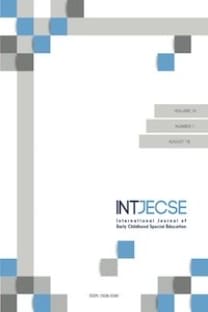Disiplinler Üstü Ekip Oluşturma: Erken Çocukluk Eğitimcisi ve Sağlık Hizmetleri Ekipleri Oluşturma Stratejileri
Yetersizliği olan çocuklar ve aileleri fiziksel, sosyal ve gelişimsel gereksinimlerinin karşılanması için genellikle çok-disiplinli profesyonel hizmetlere ihtiyaç duymaktadırlar. Mesleki eğitim, pedagoji ve uygulamadaki farklılıklar bu gereksinimlerin karşılanmasında çatışma ve karışıklık yaratabilmektedir. Hizmetlerin birleşmesinde disiplinler üstü yaklaşım (TA), çocukların ve ailelerin gereksinimlerini karşılamak amacıyla uzmanların disiplinler arası rolleri paylaşmasına izin vererek bu boşluğu doldurmaktadır. TA ekiplerinin oluşturulması süreci açıklanmış olmasına rağmen TA ekibi oluşturmada katılımcıların deneyimleri ve gelişimsel süreci büyük ölçüde araştırılmamıştır. Bu çalışma ekibin bir parçası olarak ekip üyelerinin tecrübelerini keşfetme ve disiplinler arası becerilerin gelişimini açıklama çabası içinde uzmanların kapsamlı bir TA oyun grubu içinde birlikte çalışırken edindikleri tecrübeleri incelemektedir. Bulgular amaçsal grup yansıtması gibi etkinliklerin rol paylaşma becerilerini ve rol dönüşümünü de kapsayan profesyonel rollerin evrimini etkilediğini ortaya koymaktadır.
Transdisciplinary Team Building: Strategies in Creating Early Childhood Educator and Health Care Teams
Children with disabilities and their families often require multi-disciplinary professional services to address physical, social and developmental needs. Differences in professional training, pedagogy and practice can create conflict and confusion in meeting those needs. The transdisciplinary approach (TA) of service integration bridges that gap by allowing professionals to share roles across disciplines in order to meet the needs of children and families. Although the process of developing TA teams is documented, the experiences and developmental processes of participants in TA teaming remain largely unexplored. This study examined the experiences of professionals working together in a TA inclusive playgroup in an effort to explore their experience as a part of that team, and to document the development of skills across disciplines. The findings demonstrate that activities such as intentional group reflection impacted the evolution of professional roles including role release skills and role transformation.
___
Bruder, M.B. (2000). Family-centered early intervention: Clarifying our values for the new millennium. Topics in Early Childhood Special Education, 20(2), 105-115. Carpenter, B. (2005). Real prospects for early childhood intervention: Family aspirations and professional implications. In B. Carpenter & J. Egerton (Eds.), Early childhood “intervention. International perspectives, national initiatives and regional practice. Conventry, U.K: West Midlands SEN Regional Partnership.Davis, S. (Ed.). (2007). Team around the child: working together in early childhood education. Wagga, New South Wales, Australia: Kurrajong, Early Intervention Service.
Foley, "G. M. (1990). Portrait of the arena evaluation: Assessment in the transdisciplinary approach. In E. Biggs & D. Teti (Eds.), Interdisciplinary assessment of infants: A guide for early intervention professionals (pp. 271-286). Baltimore: Paul H. Brookes.
Guralnick, M. J., Neville, B. Hammond, M., & Conner, R. (2007). The friendships of young children with disabilities. Exceptional Children, 66(4), 491-509.
Guralnick, M. J. (2001). A developmental systems model for early intervention. Infants &Young Children, 14 (2), 1-18.
Han, J., Ostrosky, M. & Diamond, K. (2006). Children’s attitudes toward peers with disabilities: Supporting positive attitude development. Young Exceptional Children, 10(1), 2-11.
Hughes, M., Shaffer, L. & Zaghlawan, H. (2008). Inclusive Play groups: Supporting the development of infants and toddlers. [Monographs Series No.10]. Young Exceptional Children 75-92.
Johnson, L. J., Gallagher, J. J., Gallagher, R. J., La Montagne, M. J., Jordan, J. B., Gallagher, J. J., Hutinger, P. L., et. al. (Eds.). (1994). Meeting early intervention challenges: Issues from birth to three (2nd ed.). Baltimore: Paul H. Brooks.
Kilgo, J. L. (Ed.) (2006). Transdisciplinary teaming in early intervention/early childhood special “education: Navigating together with families and children. Olney, MD: Association for Childhood Education International.
King, G., Tucker, M., Duwyn, B., Desserund, S., & Shillington, M. (2009). The application of a transdisciplinary model for early intervention services. Infants and Young Children. 22(3), 211-223.
Limbrick, P. (2005). Team around the child: Principles and practice. In B. Carpenter & J. Egerton (Eds.), Early childhood intervention. International perspectives, National initiatives and regional practice. West Midlands, England: SEN Regional Partnership.
Miller, P., & Stayton, V. (2000). Recommended practices in personnel preparation. In S. Sandall, M. McLean, & B. Smith (eds.), DEC recommended practices for early intervention/early childhood special education (pp. 77-88). Longmont, CO: Sopris West.
Odom, S. L., Zercher, C., Li, S., Marquart, J. M., Sandall, S., & Brown, W. H. (2006). Social acceptance and rejection of preschool children with disabilities: A mixed method analysis. Journal of Educational Psychology, 98(4). 807-823.
Reilly, C. (2001). Transdisciplinary approach: An atypical strategy for improving outcomes in rehabilitative and long-term acute care settings. Rehabilitation Nursing, 26(6), 216-220, 244.
Rossetti, L.M. (2001). Communication intervention: Birth to three. San Diego, CA: Singular-Thompson Learning.
Ryan-Vincek, S., Tuesday-Heathfield, L. & Lamorey, S. (1995). From theory to practice: A pilot study of team members’ perspectives on transdisciplinary service delivery. Infant – Toddler Intervention, 5(2), 154-175.
Sandall, S., Hemmetter, M. L., Smith, B. & McLean, M. (2005). DEC recommended practices in early intervention/early childhood special education. Missoula, MT: Division of Early Childhood Education.
Scott-Little, C., Kagan, S. L., & Frelow, V. S. (2006). Conceptualization of readiness and the content of early learning standards: The interaction of policy and research? Early Childhood Research Quarterly, 21(3), 153-173.
Shonkoff, J.P., Hauser-Cram, P., Krauss, M. W., & Upshur, C.C. (1992). Development of infants with disabilities and their families: Implications for theory and service delivery. Monograph of the Society for Research in Child Development, 57 (Serial No. 230).
Silverman, K., Hong, S., & Trepanier-Street, M. (2010). Collaboration of teacher education and child disability health care: Transdisciplinary approach to inclusive practice for early childhood pre-service teachers. Early Childhood Education Journal, 37, 461-468.
Stepans, M. B., Thomson, C. L., & Buchanan, M. L. (2002). The role of the nurse on a transdisciplinary early intervention assessment team. Public Health Nursing, 19(4), 238-245.
Spradley, J. P., (1980) Participant Observation. New York: Holt. Rinehart and Winston. Strauss, A., & Corbin, J. (1998). Basics of qualitative research: Techniques and procedures for developing grounded theory (2nd ed.). Thousand Oaks, CA: Sage.
Tobin, J., Hsueh, Y., & Karasawa, M. (2009). Preschools in Three Cultures: China, Japan, and the United States: Revisited. The University of Chicago Press.
- ISSN: 1308-5581
- Başlangıç: 2009
- Yayıncı: İbrahim H. DİKEN
